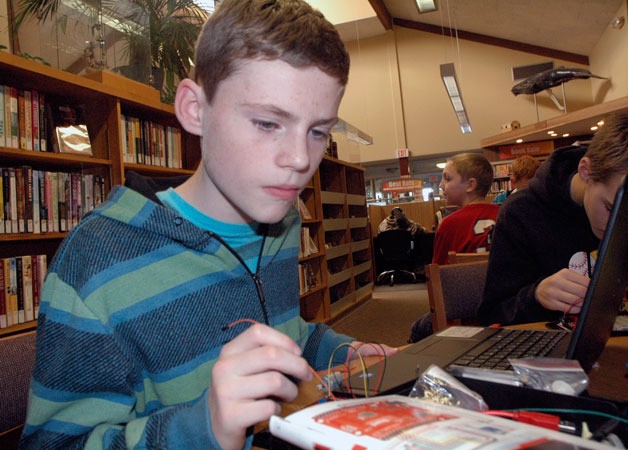ARLINGTON — Although the two tables of kids at their laptops did their best to maintain respectfully low tones, the Arlington Library was nonetheless abuzz with flashing lights and electronic noises on Wednesday, Oct. 23, as the eight students in the fourth and final week of “Explore Arduino” saw their programming lessons pay off.
The Sno-Isle Libraries Foundation secured a strategic initiative grant for the “Explore Arduino” course in do-it-yourself electronics, which was new to the Arlington Library and enlisted the aid of its teen librarian, Kelli Bragg, to provide in-library demonstrations and supervise the students’ hands-on interactions with the equipment.
“That money was set aside for exploring technology,” said Bragg, in between examining the kids’ connections between their laptops and their circuit boards. “The goal of this project is to teach them physical computing, to show them how to get their computers to run tools in the real world, whether it’s making coffee or watering plants.”
The culminating project of the four-week “Explore Arduino” course was a bit simpler, but by teaching them how to light up LEDs and make electronic music play, Bragg hopes that the students will be armed with basic skills that they can apply to more complex programming tasks.
“I was surprised by how quickly the kids took to the circuit boards and all their components, although it did help that the kits did a lot to guide them through the process,” said Bragg, who noted that each kit cost about $100. “From there, they downloaded the programming codes.”
Although only four kids attended all four classes, Bragg estimated that the classes maintained an average of about eight students each week, whom she assisted in their final week by helping them diagnose any problems with their work.
“The troubleshooting has been the hardest part of this project,” Bragg said. “Then again, that’s usually the hardest part of any project like this. It takes time to figure out whether they’ve plugged something into the wrong spot, or whether they might just have a bad LED unit.”
While the course’s programming tasks can be demanding, Bragg reported that all of her students were fully engaged with the material, and confident in their own ability to tackle it.
“They really appreciate the physicality of the engineering, I think,” Bragg said. “When they made the right connections, lights would go on and music would start to play. It’s a great way to introduce them to electronics and computing at this age without scaring them. The first time I mentioned the word ‘programming,’ a few of them tensed up, but they’ve done very well with coding and assembly, and gotten really enthusiastic about it. As opposed to standard classroom lectures, I think a lot of kids are just naturally hands-on learners.”
All of the students who spoke to The Arlington Times echoed Bragg’s sunny evaluation of their “Explore Arduino” experiences.
“It’s been fun,” said 10-year-old Peter Scollard, leading with the same word that all the kids used right away to describe how they felt about the course. “I liked making all the stuff and figuring out how to do things.”
Scollard was only able to attend three of the classes, after his mother read about the course being offered at the Arlington Library in the newspaper. In spite of not having any prior robotics experience, he’s already considering buying a kit of his own.
“I like being able to make things work,” said 11-year-old Darius Storm, who attended all four classes. “I built a robot arm before, but that didn’t have a computer chip, like this. It was hard-wired. This isn’t like when I tried to fly an RC plane, and the prop wouldn’t turn. That was discouraging.”
Fellow 11-year-old four-class-attendee Owen LaSalata was already a bit of a gear-head going into this course, but the experience more than lived up to his standards.
“I love robotics,” LaSalata said. “I’m involved in like three or four different clubs for it. I like science so much, but robotics is the most fun. A lot of other sciences are about mixing things, but I like working with parts more than I like mixing substances.”
At the age of 14, Michael Coalwell had little prior experience in this field.
“I bought one kit, but that was because my mom wanted me to make a game show buzzer for a 4-H program,” said Coalwell, in between snatching cookies from the shared wealth of snack foods at the center of his table of four. “It’s been great building new things, though.”
Science-minded kids who missed out on “Explore Arduino” will have another chance to get their science on at the Arlington Library with “Crazy Concoctions: A Mad Scientist’s Guide to Messy Mixtures,” which starts at 2 p.m. on Saturday, Oct. 26, and will feature experiments and recipes from the book by Jordan D. Brown, as kids wear old clothes and get ready to get messy in the name of science.
The Arlington Library is located at 135 N. Washington Ave. in Arlington. For more information, call 360-435-3033.







